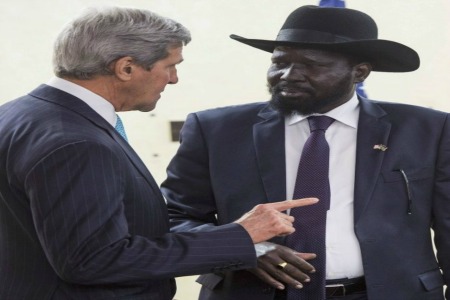
JUBA, South Sudan (AP) — Confronting global fears of genocide, South Sudan’s president tentatively agreed Friday to revitalize peace talks that have been stalled for months, taking what the U.S. described as a necessary step toward creating a new government and halting rampant bloodshed in the world’s newest nation.
But it was not immediately clear whether President Salva Kiir’s main rival would participate in the talks, despite being urged by U.S. Secretary of State John Kerry.
Following a 90-minute meeting in Kiir’s lush office compound, Kerry announced the negotiations could begin as early as next week. He said Kiir “committed very clearly” to begin discussions, mediated by Ethiopian Prime Minister Hailemariam Desalegn, for a cease-fire and a transitional government.
Kiir did not speak to reporters after his meeting with Kerry, and his government did not immediately confirm the tentative agreement. Kerry did not have a similar commitment from opposition leader Riek Machar, the former vice president-turned-rebel, although he has previously indicated he would engage in peace talks.
“The unspeakable human costs that we are seeing over the course of the last months, and which could even grow if they fail to sit down, are unacceptable to the global community,” Kerry said. “Before the promise of South Sudan’s future is soaked in more blood, President Kiir and the opposition must work immediately for cessation of hostilities and to move toward an understanding about future governance for the country.”
Launching the South Sudan negotiations, if they happen, would give Kerry a much-needed boost in his frustrated efforts to broker peace. His nine-month attempt to end decades of tensions and bloodshed between Israel and Palestinian leaders broke down last week, and negotiations to calm crises in Syria and Ukraine similarly have fallen flat.
If the peace talks happen, they would mark a turning point in nearly six months of horrific fighting that has largely broken down along ethnic lines between rival Dinka and Nuer tribes. The violence has been compared to genocide and could also lead to famine later this year. Farmers among the nearly 1 million South Sudanese who have fled their homes have had to abandon their crops.
Thousands have been killed in the fighting, which began when Kiir, a Dinka, accused Machar, a Nuer, of plotting a coup to seize power last December. An earlier ceasefire agreement, reached last January, was abandoned within days.
South Sudan peacefully broke away from Sudan in 2011 after a decades-long fight for independence. Relations between the two countries have been strained since the split and both countries have suffered from instability and sporadic violence.
Kerry’s trip to Juba was not widely publicized out of security concerns, and he spent only several hours there before flying back to the Ethiopian capital Addis Ababa for the night. While in Juba, he met privately with South Sudanese activists and refugees who are living under harsh conditions in United Nations camps.
His motorcade attracted curious stares but no hostilities on Juba’s hot, quiet streets, many of which were lined with mud huts and scrap heaps. And before his arrival, Kiir’s government issued a statement promising to work with Kerry to end the bloody conflict.
“Bloodshed is an undeniable part of our past,” Information Minister Michael Makuei Lueth said in a Thursday statement. “We hope that all parties are ready to come together to ensure that it will not be a part of our future.”
If Kiir and Machar fail to move strongly to curb the violence, or if other fighters continue to violate human rights and disrupt humanitarian aid, Kerry said they could face economic sanctions by the U.S. and United Nations to freeze the assets and travel privileges of South Sudan’s elite, or potentially, prosecution by international courts.
“The single best way for leaders and people in positions of responsibility to avoid the worst consequences is to take steps now,” Kerry said. “We are not going to wait. There will be accountability in the days ahead where it is appropriate.”
Kerry is also trying to convince African nations to send peacekeeping and protection troops to South Sudan within upcoming weeks, but some leaders have been reluctant to be part of a broader United Nations force. So far, Kerry said, African officials have committed only between 2,500 and 5,500 troops for the country of 11 million people, and the mission must first be approved by the U.N. Security Council.
Unlike in Syria, where the U.S. has demanded that President Bashar Assad play no part in a transitional government, Kerry declined to say whether Kiir or Machar ultimately could have a role in South Sudan’s future leadership. He said that will be up to South Sudan’s people to decide.
Still, he added: “If both sides do not take steps in order to reduce or end the violence, they literally put their entire country in danger.”
“And they will completely destroy what they are fighting to inherit,” Kerry said.